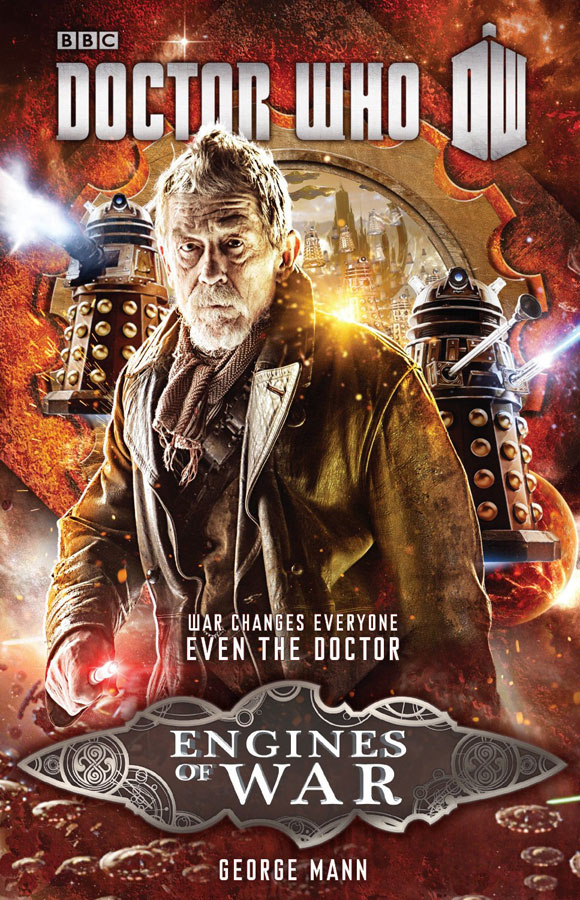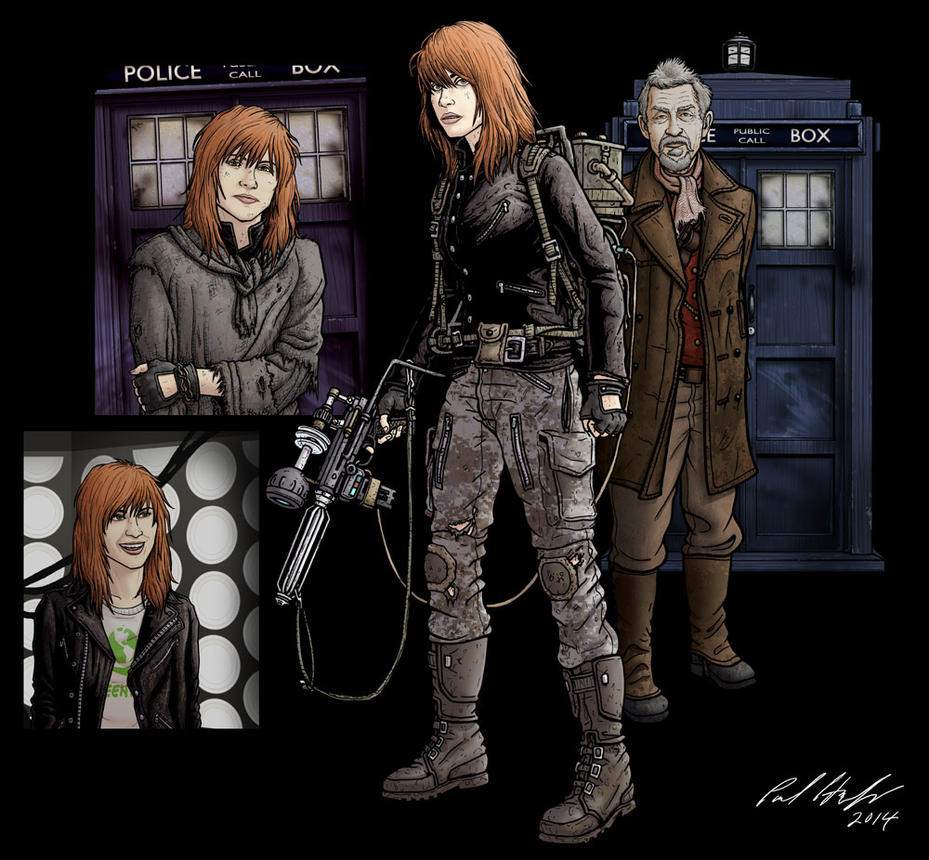This is a particularly exciting release for Doctor Who fans.
The first full length adventure for John Hurt's lost incarnation of
the Time Lord. Whether more will be forthcoming has yet to be seen,
but considering the reception this book has had, I think it is very
likely. Whether this is a good idea is another question.
George Mann is a fine choice for a book such as this, adept at crafting an action-packed tale. His prose is clear and straightforward, pacey and easy to enjoy. Just the sort of writer for a war-time tale of Time Lords and Daleks. Taking place in the final days of the Time War, this sees the War Doctor pit himself not only against the Daleks, but the High Council of the Time Lords. Both sides are making moves to end the War, contemplating appalling acts to ensure their own survival. It's a story of the Doctor's last stand at the moral high ground, with the events of this book finally convincing him that there must be “no more.”
 Nonetheless, this is a Doctor
Who book through and through,
and anyone hoping for something unique Who
adventure all the same. As such,
it has its own one-off companion figure, the young fighter Cinder,
who the Doctor picks up from the Dalek-occupied planet Moldox. While
she could easily have fallen into a stereotypical character of the
tough kid shaped by war, Cinder is likeable enough, and recognisable
enough, to become a strong protagonist. Someone we can care about
amongst the cosmic battles going on around her, even if her final
fate is inevitable.
Nonetheless, this is a Doctor
Who book through and through,
and anyone hoping for something unique Who
adventure all the same. As such,
it has its own one-off companion figure, the young fighter Cinder,
who the Doctor picks up from the Dalek-occupied planet Moldox. While
she could easily have fallen into a stereotypical character of the
tough kid shaped by war, Cinder is likeable enough, and recognisable
enough, to become a strong protagonist. Someone we can care about
amongst the cosmic battles going on around her, even if her final
fate is inevitable.
should look elsewhere. This is a high stakes and emotionally charged adventure, but it's a
It's a continuity-heavy book – not Craig Hinton levels of fanwank, but considerable references to the past of the series. This is natural enough for a Gallifrey-centric story, and it never reaches the point where it becomes a distraction. New series fans tempted by this tie-in to The Day of the Doctor may come away somewhat confused by some of the references, but for the most part they help push the story along. If anything, the numerous references to Gallifrey's past help sell the concept that this is an ancient and rigid culture, even as we see its decay. I hadn't expected it to be quite such a tie-in to The Five Doctors, though, by far the most referenced story over the course of the book.
Certain elements of the story work especially well, exploring the untold details of the Time War. Throwaway terms such as the Skaro Degradations are brought to life. The horrific details of the Dalek war machine evoke a terrifying conflict, and particularly effective in the first third of the book, which focuses on the human cost of the War. We see the War from the viewpoint of the “lesser species,” as their worlds are dominated by Daleks or sacrificed by the Time Lords to further an advancement or defence. Also well characterised is Rassilon, here in his Timothy Dalton incarnation, and we see the depths he is capable of sinking to in order to further his endless life.
It's in the portrayal of the Doctor that the book is constrained however. At the end of the day, the Doctor is the hero of the book, and can't get his hands too dirty. However appalling his decision to destroy Gallifrey was, it was something the later Doctors admitted to. There must have been far worse sins committed during his time on the front line, but little of that is explored here. We get plenty of combat fatigue and broken faith, but little of what would cause the Doctor to abandon this incarnation as “the one who broke the promise.” Indeed, he introduces himself as someone who used to be called the Doctor, and this is the name he is called throughout the book. I understand that this is a practical choice, but it hammers home that this is still the Doctor being Doctorish, and not the terrible warrior he would later try to forget. Only the Daleks seem to have the appropriate fear and reverence for this incarnation; they, in contrast, refer to him as the Predator.
Mann excels at portraying the more visceral side of the conflict, and makes a good stab at exploring the effects of temporal warfare, something that is never easy to develop in detail. While this is an exhilarating read – it's easy to imagine this as a Doctor Who movie with a huge budget – the Time War is just too horrific and too alien to be explored in too much depth. Engines of War works, but too much War Doctor could weaken his impact.
Above illustration by Paul Hanley.
George Mann is a fine choice for a book such as this, adept at crafting an action-packed tale. His prose is clear and straightforward, pacey and easy to enjoy. Just the sort of writer for a war-time tale of Time Lords and Daleks. Taking place in the final days of the Time War, this sees the War Doctor pit himself not only against the Daleks, but the High Council of the Time Lords. Both sides are making moves to end the War, contemplating appalling acts to ensure their own survival. It's a story of the Doctor's last stand at the moral high ground, with the events of this book finally convincing him that there must be “no more.”
 Nonetheless, this is a Doctor
Who book through and through,
and anyone hoping for something unique Who
adventure all the same. As such,
it has its own one-off companion figure, the young fighter Cinder,
who the Doctor picks up from the Dalek-occupied planet Moldox. While
she could easily have fallen into a stereotypical character of the
tough kid shaped by war, Cinder is likeable enough, and recognisable
enough, to become a strong protagonist. Someone we can care about
amongst the cosmic battles going on around her, even if her final
fate is inevitable.
Nonetheless, this is a Doctor
Who book through and through,
and anyone hoping for something unique Who
adventure all the same. As such,
it has its own one-off companion figure, the young fighter Cinder,
who the Doctor picks up from the Dalek-occupied planet Moldox. While
she could easily have fallen into a stereotypical character of the
tough kid shaped by war, Cinder is likeable enough, and recognisable
enough, to become a strong protagonist. Someone we can care about
amongst the cosmic battles going on around her, even if her final
fate is inevitable.
should look elsewhere. This is a high stakes and emotionally charged adventure, but it's a
It's a continuity-heavy book – not Craig Hinton levels of fanwank, but considerable references to the past of the series. This is natural enough for a Gallifrey-centric story, and it never reaches the point where it becomes a distraction. New series fans tempted by this tie-in to The Day of the Doctor may come away somewhat confused by some of the references, but for the most part they help push the story along. If anything, the numerous references to Gallifrey's past help sell the concept that this is an ancient and rigid culture, even as we see its decay. I hadn't expected it to be quite such a tie-in to The Five Doctors, though, by far the most referenced story over the course of the book.
Certain elements of the story work especially well, exploring the untold details of the Time War. Throwaway terms such as the Skaro Degradations are brought to life. The horrific details of the Dalek war machine evoke a terrifying conflict, and particularly effective in the first third of the book, which focuses on the human cost of the War. We see the War from the viewpoint of the “lesser species,” as their worlds are dominated by Daleks or sacrificed by the Time Lords to further an advancement or defence. Also well characterised is Rassilon, here in his Timothy Dalton incarnation, and we see the depths he is capable of sinking to in order to further his endless life.
It's in the portrayal of the Doctor that the book is constrained however. At the end of the day, the Doctor is the hero of the book, and can't get his hands too dirty. However appalling his decision to destroy Gallifrey was, it was something the later Doctors admitted to. There must have been far worse sins committed during his time on the front line, but little of that is explored here. We get plenty of combat fatigue and broken faith, but little of what would cause the Doctor to abandon this incarnation as “the one who broke the promise.” Indeed, he introduces himself as someone who used to be called the Doctor, and this is the name he is called throughout the book. I understand that this is a practical choice, but it hammers home that this is still the Doctor being Doctorish, and not the terrible warrior he would later try to forget. Only the Daleks seem to have the appropriate fear and reverence for this incarnation; they, in contrast, refer to him as the Predator.
Mann excels at portraying the more visceral side of the conflict, and makes a good stab at exploring the effects of temporal warfare, something that is never easy to develop in detail. While this is an exhilarating read – it's easy to imagine this as a Doctor Who movie with a huge budget – the Time War is just too horrific and too alien to be explored in too much depth. Engines of War works, but too much War Doctor could weaken his impact.
Above illustration by Paul Hanley.

No comments:
Post a Comment